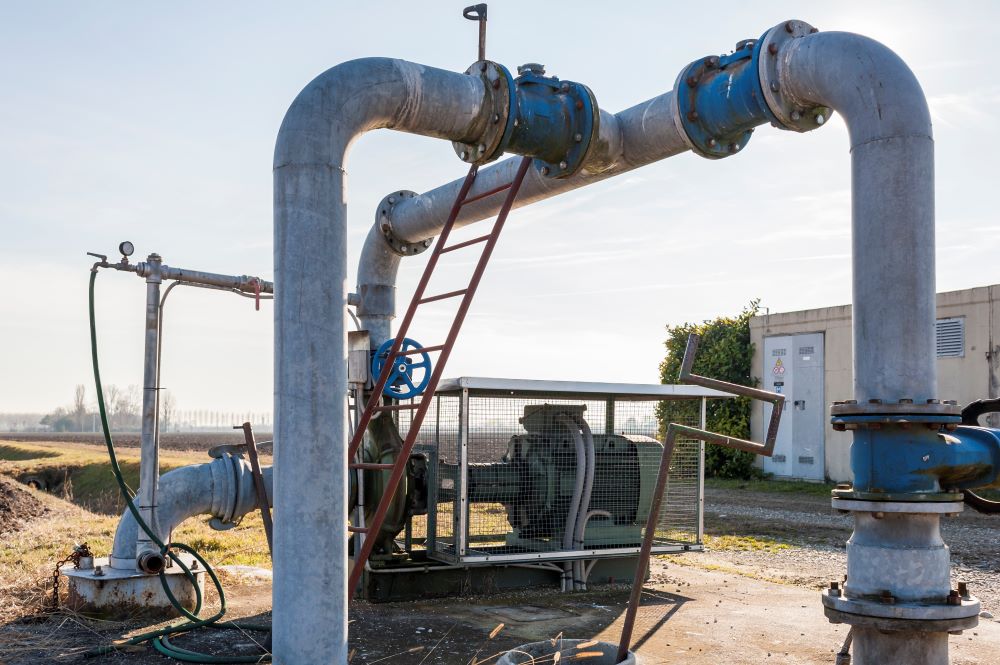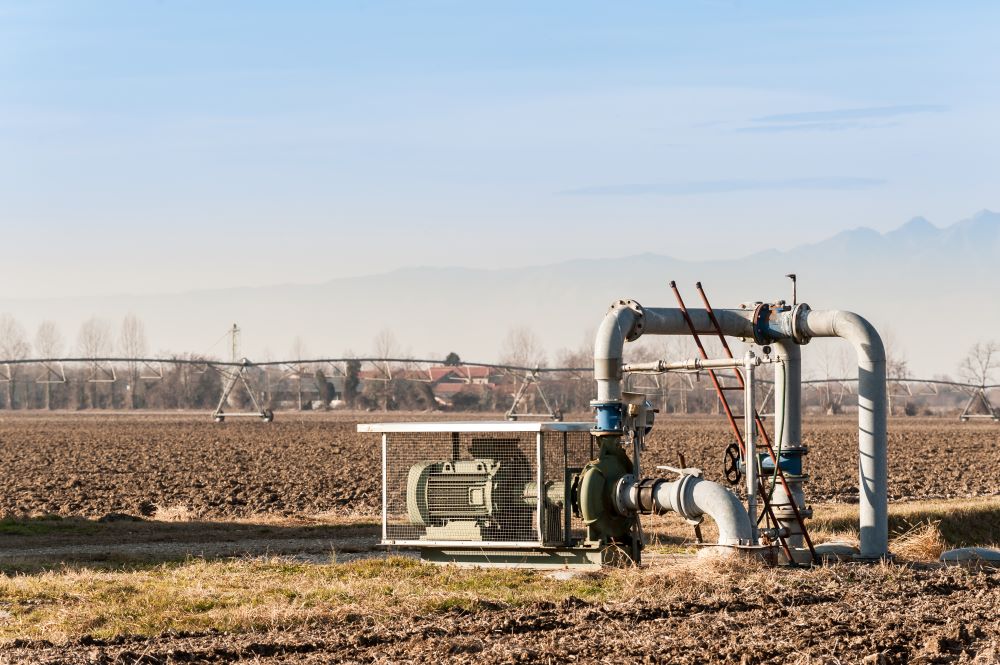Irrigation Water Pumps: Choosing the Right Type for Your Business Needs

When running a business that relies on water—whether a small farm or garden or a large-scale agriculture operation—using the right irrigation pump will help you stay efficient and effective. That’s because the best-suited irrigation pump ensures water gets to where it’s needed, exactly when it’s needed.
But, choosing the wrong pump can lead to an irrigation system without enough water or waste power and resources. And even if it works, it could fail sooner, meaning more breakdowns, repairs, and downtime.
So, here’s the thing, there are different types of irrigation water pumps out there. How do you know which one’s the best fit for you? Read on to learn more.
What Are Irrigation Water Pumps?
When we talk about ‘irrigation’ it means watering the land area that’s home to growing plants.
It’s especially useful when natural water sources and rainfall aren’t enough to meet the water needs of plants, particularly in areas with irregular rainfall or during dry spells.
An irrigation water pump directs water from one location (i.e. lake, wells, reservoir, etc.) to another (i.e. agricultural fields), ensuring it’s available where it’s most needed, whether for farms, businesses, or communities. It’s generally a part of your water management efforts.
For example, farmers or ranch owners can take advantage of an irrigation pump to properly supply water for their crops, and livestock, or even use it for domestic purposes.
Additionally, a water irrigation pump, particularly the centrifugal pump type, is beneficial for industrial use, especially for feeding cooling towers, heat exchangers, and boilers.
Simply put, irrigation water pumps are like highways for the water, making sure water flows efficiently and reaches its intended target. Its goal is to help maintain healthy plant life or support various processes.
Why Choosing the Right Irrigation Pump Matters?
Three things: operational efficiency, sustainability, and cost-effectiveness.
- The right irrigation pump promotes operational efficiency: It affects how effectively water is being distributed while ensuring that the water requirements for your crops or any other application are met well. This, in turn, minimises wasting water resources and leads to optimised productivity and lesser downtime issues.
- It supports sustainability: Using the best irrigation pump that aligns with your needs allows you to manage water resources responsibly, without wasting or overusing water or energy.
- Getting the right irrigation pump enables you to save more: Choosing the wrong type, like if it’s too big or small, or its functions do not serve your bottom line well, can affect your energy bills, increase maintenance costs or cause more frequent breakdowns. All these concerns can be avoided if you’re able to select the proper pump from the beginning.
Types of Irrigation Water Pumps
Surface Water Pumps
Surface water pumps are installed outside the water source. This allows them to pump water from nearly any type of water source (lakes, rivers, reservoirs, etc.). However, due to physical limitations, they are generally effective for pumping from deeper than eight meters.
Furthermore, surface pumps are designed to handle clean or lightly contaminated water. Some of its applications include agriculture, residential or commercial, fire safety, and circulation of ponds and fountains.
When it comes to its advantages, it is generally more affordable, easier to maintain, and accessible. However, if damaged, repairs can be time-consuming, especially if disassembling is recommended.
Submersible Water Pumps
Submersible water pumps are fully submerged underwater and are best for deep water sources like wells. This type of irrigation pump features waterproof components, therefore not requiring any priming.
They are typically run by electrical energy, specifically an electric motor that can be dry or wet. However, they can also be powered by hydro, solar, or wind energy.
Some applications of this pump include groundwater extraction, fountain and pond circulation, flood control and emergency response situations, and sewage and wastewater management, among others.
Centrifugal Pumps
Centrifugal pumps are a famous option for irrigation because of their versatility (they can operate on dry land or water), budget-friendliness, and ease of installation and maintenance. They are also recognised for their efficiency in high-volume irrigation systems but may not be as effective at moving water uphill or to longer distances.
This kind of irrigation pump works through impellers or blades that rotate water within the casing or chamber–the rotating action is known as “centrifugal force,” helping the water travel through the pump.
Some applications for centrifugal pumps include water treatment, mining, oil and gas, and agriculture.
Positive Displacement Pumps
While centrifugal pumps are the most commonly installed for an irrigation pump system, positive displacement pumps can handle more difficult conditions, especially for high-viscosity applications.
A positive displacement pump is a type of irrigation pump that moves water through mechanical energy. It has suction and discharge sides. It uses motion to trap fluid into a compartment and discharge it using a nozzle. With each cycle, it pumps the same amount of water, so it’s a constant volume pump.
Using it offers several advantages such as its ability to handle fluids of high or low viscosity, maintain a constant flow rate despite pressure changes, and its durability and cost-effectiveness.
Some of its common applications include pumping water from low-pressure sources to higher elevations, transporting oil or gas through pipelines, waste or slurry in water treatment plants, and processing viscous chemicals.
Solar-Powered Irrigation Pumps
A solar-powered irrigation pump is eco-friendly and an energy-efficient alternative.
It is powered by a solar panel, which means, the energy you need comes free from the sun. It operates by converting the sun’s rays to electricity, which will be used to power the water pump.
It is generally economical to operate and easy to maintain and install. It is especially useful for remote areas or off-grid applications.
Choosing the Best Irrigation Water Pump for Your Business

The question still remains–how do you choose the best irrigation water pump for your business needs? Consider the following factors:
- What type of water source do you have? The water source will affect the type of pump you need. Will you work with a water source below ground level? A submersible pump may be more applicable to your needs. Does your water source require handling viscous fluids? A positive displacement pump could be your way to go.
- Which type of power source do you prefer? An irrigation pump can be electricity, engine, or solar-powered. Consider your location and specific needs. For example, electric-driven pumps may not be suitable in a remote area where power outages are common. Solar-powered pumps can be generally useful and inexpensive, but you must prepare yourself on rainy days when sunlight is limited.
- Check water flow and pressure requirements: Choose a pump that can handle your irrigation system’s water flow and pressure requirements. For instance, centrifugal pumps can be the best option to handle large volumes of low-viscosity fluids with high flow rates. Positive displacement pumps are better for precise flow control, high pressure, and high-viscosity fluids.
Irrigation Pump Recommendations According to Business Type
To make it easier for you, here’s a quick recommendation guide based on your business or industry:
| Business Type | Recommended Pump Type | Why? |
| Small farms & gardens | Centrifugal pumps, solar pumps | Cost-effective, easy to maintain |
| Large-scale agriculture | Centrifugal pumps | Moves large volumes of water with less energy consumption, crucial for cost-effective large-scale operations |
| Wastewater Management | Submersible pumps | Used for transferring raw sewage and handling solids. They are designed for harsh environments. |
| Horticulture (Greenhouses & nurseries) | Positive displacement pumps | Precise water control for delicate plants |
| Remote/off-grid areas | Solar-powered irrigation pumps | Eco-friendly, reduces dependency on electricity |
Our Final Tip: Think About Durability and Maintenance
No matter which type of irrigation pump you’ve decided to use for your business needs, it is essential to use one that’s durable and easy to maintain.
Look for pumps made from high-quality materials such as cast iron, stainless steel, or aluminium, among others. Always make sure to clean it as necessary and perform maintenance tasks to prolong its life.
However, above everything, the best move would still be to seek guidance from the experts.
Consult a reliable water pump distributor in Singapore like Lian Beng Machinery Co. for expert advice and heavy-duty, premium irrigation pumps.
For 30 years in distribution, our team has been supplying industrial and construction machinery in Singapore and nearby ASEAN countries.
We want you to experience the difference that comes with choosing a distributor with a proven track record of providing trusted, high-performing equipment. Contact us to learn more.
